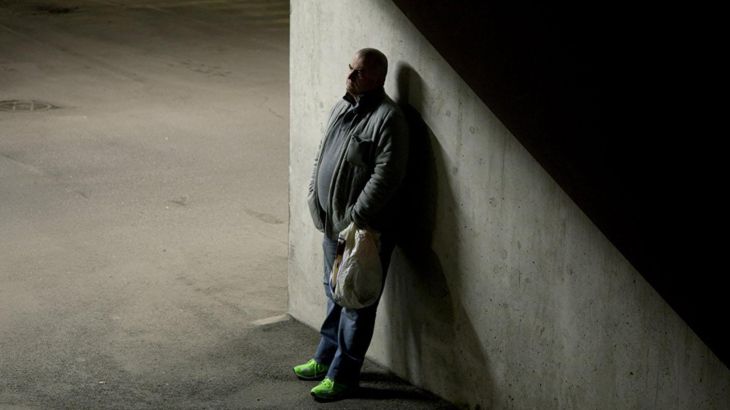
The Unforgiven: A War Criminal’s Remorse
A notorious war criminal searches for the prisoners he tortured during the Bosnian War to seek their forgiveness.
Esad Landzo was convicted of torture, war crimes and crimes against humanity at the International Criminal Tribunal for the former Yugoslavia in 1998.
He was a 19 year old prison guard at the Celebici camp in Konjic, Bosnia, notorious for abuse and torture of prisoners of war, many of whom were civilians, during the Bosnian War.
Keep reading
list of 4 itemsAustralian war crimes whistleblower David McBride jailed for six years
Will Israel’s war on Gaza sway South Africa’s election?
Masked Tunisian police arrest prominent lawyer for media comments
When he is released from prison in Finland after 10 years, Landzo is without a job and unable to get a visa from any other country.
Desperate to rebuild a normal life, but tormented by the demons of his past, he begins an exhausting search for the men he tortured in an attempt to repent for the suffering he caused.
A handful agree to listen, but their anger is palpable as they confront the horrific violence of their past.
FILMMAKER’S VIEW
By Lars Feldballe Petersen
In 1992, the images of the Bosnian War hit me with a force so strong that they are still etched in my mind today. Europe was burning again and I was compelled to ask:What drives people beyond their own limits and societal norms?
How do they explain their actions and how do they relate to them afterwards? Do they regret? Do they seek forgiveness? Or are they forever hardened and committed to justifying their actions? … Would they do it again? In fact, several of my films explore these questions.
While working on a film called ‘Crossing the Line’ in 2006, I met Esad Landzo. He was 30 years old then and had served 7 of the 15 years he had been sentenced to.
Esad made a strong impression on me and, as I was already working on the other film, I decided to continue watching and filming him on the journey he had begun in the Finnish prison. It was a journey back to himself and back to an existence that, at the time, seemed impossible to imagine: without an education and unable to return to his native Bosnia, life after the end of his sentence was uncertain.
But there was something different about Esad. For the first time, it became clear to me that the basic theme I had been working on needed to be expanded. Esad, more than anyone else I’d met, had the courage to put into words the central question I’d been looking for: What makes people cross the lines of acceptable behaviour and commit indescribable cruelty?
Can offenders and victims move on without reconciling with each other and with their shared past? ... How else should we put wars behind us, all our wounds and losses, and resume life with an optimistic belief in our future?
Meeting Esad also made me see the role that victims, survivors, and each of us in society as a whole also play because Esad had a burning desire to become ‘one of us’ again. A desire to be worthy of life, to be at peace with himself, with his family and the outside world. But throughout the film he begins to have the significant realisation that he cannot lift the curse of war single-handedly because everyone has been affected and afflicted by it.
What he wants more than anything is to be forgiven, he believes that if he can relieve the pain of some of his victims and survivors, he might be able to envisage a future for himself, but he understands that the best he can hope for might be to just relieve some of his own suffering.
As he tries to make amends, difficult questions are raised: What does punishment mean, if it’s not followed by a form of forgiveness? What motivation does the criminal, the executioner, the fighter have to get back on track, to improve and change, if not the belief that change is possible and the curse can be lifted?
Can offenders and victims move on without reconciling with each other and with their shared past? Do we not just have to offer and accept forgiveness of some form? How else should we put wars behind us, all our wounds and losses, and resume life with an optimistic belief in our future?
By following Esad closely and filming him for 12 years, I have had a unique opportunity to examine all these feelings and reflections from a deeply personal angle. In the film, we see that he is willing to return and confront his victims and the survivors in an effort to show a possible way forward for them and himself.
In Esad I have met a gifted and charismatic person with a unique ability to put his thoughts and feelings into words. Esad is also one of the most sincere and reflective people I have ever met. It is my conviction that, thanks to the confidence he has shown in me through these many years of intense work and self-reflection, that my film will be able to shed light on some of his reflections and offer a new basis for an important conversation about guilt, reconciliation and the possibility of forgiveness.